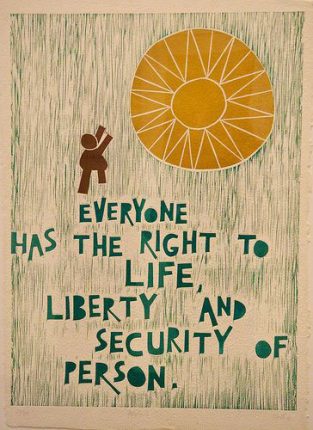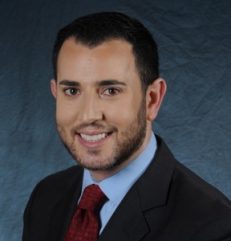Related Posts
Human rights are a public health issue

Woodcut illustration of Article 3 of the Universal Declaration of Human Rights, by Brazilian artist Otávio Roth.
I was reminded recently that today, December 10, is the 70th anniversary of the Universal Declaration of Human Rights. The person bringing it to my attention was Benjamin Meier, JD, LLM, PhD, adjunct professor of health policy and management in the Gillings School and past chair of the APHA Human Rights Forum. Dr. Meier is an associate professor of global health policy and is the Zachary Taylor Smith Distinguished Professor of Public Policy at UNC-Chapel Hill.
“I hope that this anniversary celebration on Human Rights Day will provide a helpful opportunity for the Gillings School community to reflect on the 70-year evolution of human rights in public health,” Meier wrote in an email.
This year, especially, is one in which we must ask whether we, as public health professionals, are doing all we can to ensure that human rights are being protected. Those of us living comfortably in the U.S., many of us wrapped in our cocoons of privilege, may not see or want to see what is happening in other parts of the world – or even in our own country. We, and I include myself, may feel powerless to stop atrocities or interfere with laws and policies that deny human rights.
I suspect that most of us would agree that we need to do more. Human rights are not ensured for all people, nor is the concept a given premise and set of values on which all leaders and people of the world agree. Many are pained to find that our own government has separated families said to have entered the country illegally. Human rights are easily thwarted or denied in today’s rightward trend of global leadership.
In this context, next fall, with passionate support from Gillings School students and faculty members, we will launch a new MPH concentration, Health Equity, Social Justice and Human Rights. The students who engage in this course of study will graduate with a keen understanding of human rights issues. This is a major advance for our School.
In an article published today in The Lancet, Dr. Meier, Professor Larry Gostin and colleagues observed:
Human rights provide a universal framework for advancing global health with justice, transforming moral imperatives into legal entitlements. Created out of the atrocities of World War II, states in the newly formed UN established human rights under international law. The 1945 UN Charter became the first international treaty to recognise human rights, which form the principal foundation of this new world body. Operating through the UN Economic and Social Council (ECOSOC), the UN would “make recommendations for the purpose of promoting respect for, and observance of, human rights and fundamental freedoms for all.”
With the UN charter also calling for the establishment of an international health organisation, WHO had the responsibility to operationalise human rights for public health. The 1946 WHO Constitution declared, for the first time, that “the enjoyment of the highest attainable standard of health is one of the fundamental rights of every human being,” thereby establishing government responsibilities to ensure “a state of complete physical, mental, and social well-being and not merely the absence of disease or infirmity.” In creating a rights-based foundation for global health governance, the WHO Constitution represented the world’s most expansive conceptualisation of international responsibility for health.
*Note: Refer to original article for several footnotes omitted in this excerpt.
It is sobering to realize how recently the concept of human rights became an integral part of the ways by which countries operate. The concept likely is not known or understood by many world leaders or by many in public health. I learned some of this information in an ethics course I took as a graduate student, but I had not thought as deeply as I might have about the implications of human rights for everyday public health.
We focus on getting health care to people, but we do not often consider the larger context in which health exists. For example, in war-ravaged countries such as Syria and Yemen, thousands of civilians, including many children, have been killed or wounded. Even hospitals run by Doctors Without Borders have been struck, resulting in multiple casualties. Furthermore, widespread destruction of infrastructure and problematic embargoes have resulted in lack of access to food, clean water, and essential medicines and medical care, threatening the health, human rights and lives of millions.
Here at the Gillings School, Julie MacMillan, MPH, managing director of Research, Innovation and Global Solutions, emphasizes that faculty members including Sheila Leatherman, Dilshad Jaff and others are doing “inspiring work on behalf of health care quality for the millions of people who live in fragile states, conflict zones and humanitarian settings.”
Professors Gostin, Meier and colleagues conclude:
While we celebrate the enduring legacies of human rights, we must also strive to identify and rectify the constraints on rights-based governance for public health in a globalising world. It is more important than ever for the health and human rights communities to stand together as partners to uphold the values of the UDHR and resist contemporary threats to human rights. The human rights progress of the past, bringing together top-down leadership in global health governance with bottom-up civil society advocacy, highlights the importance of sustained political engagement to realise the right to health. Health practitioners have a crucial role in this political engagement, advancing rights-based public health policies, programmes, and practices that are essential to secure the future of human rights in global health.
For those of us fortunate enough to live in countries whose leaders generally strive to respect human rights, perhaps one of the most important ways to commemorate Human Rights Day, aside from expressions of gratitude, is to educate ourselves and others so that we can participate in conversations about, advocacy for and actions to uphold human rights.
The Lancet article is an excellent overview of the issues. I encourage you to read it. You also may be interested in two other works by Ben Meier and colleagues:
- Human Rights in Global Health: Rights-Based Governance for a Globalizing World, edited by Meier and Gostin and published by Oxford University Press last April, which assembles contributions from 48 leading health and human rights scholars and practitioners from academia, nongovernmental organizations, and the United Nations system; and,
- “Human Rights in Public Health: Deepening Engagement at a Critical Time,” in the Health and Human Rights Journal.
Barbara
______________________________________________________________
The views expressed in this blog are Barbara Rimer’s alone and do not represent the views and policies of The University of North Carolina or the Gillings School.

